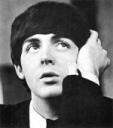The Beatles Literary Anthology; Mike Evans, Ed. I enjoyed this collection ofserious and not so serious writings about the Beatles; balanced, occasionally insightful and occasionally amusing. Worth bothering with by serious Beatles students.
Band on the Run: A History of Paul McCartney and Wings; Garry McGee. I give this a VERY low score on accuracy. More then a sentence here without acknowledgement are taken verbatim from either Solewicz or Flippo (neither of whom are more then occasionally accurate as well as being more hostile to Paul then not. It does have a few nice Photos. The chart statistics gathered in the back are interesting as his analysis of them. Very light weight and a good 20 years out of date.
Paul McCartney; 20 Years on His Own; Edward Gross. Except for a few nice quotes I havn’t seen elsewhere, copy the above review.
In My Life, Encounters with The Beatles; Edited by Robert Cording, Shelli Jankowski-Smith and EJ Miller Laino. Another collection that in no way stands equal in interest to the above Anthology nor Read the Beatles. The ONLY book about the Beatles that plunged me into immediate and rather deep depression! A true loser in my opinion. Worn to transparency, they are the lost surviving examples of late-blooming pseudo intellectualists with sad, blurred pretensions of cool.
Paul McCartney; Behind the Myth; Ross Benson; The accurate subtitle would be “How Paul Destroyed the Beatles and Was A Failure Alone.” Possibly the ugliest of all the carefully chosen photos of Paul on the cover. The author is obsessed with the idea that Jim McCartney was what was wrong with Paul — a theory that gets old fast. his antipathy for Paul hints at a personal grudge. Among other problems, like ‘edited’ material offered between quotation marks and some untruths that appear to be the author’s own, it’s an inept hatchet job considered against similar books.
McCartney, Christopher Sandford. It would be far easier to mark the true statements rather then the errors. Unflattering photographs abound He combines the prose of a WWII war correspondent for Hustler with the hysterical hatred as intense as the Pope’s toward Martin Luther. All in all, I wonder what the name of his failed garage band was.
Meet the Beatles, A Cultural History of the Band That Shook Youth, Gender, and the World; Steven D. Stark. I strongly disagree with some of his sociological theories and many of the quotations are grossly time-shifted — without acknowledgement of that fact. He attributes most jointly composed songs to John alone. Included are several weird “what ifs” that are completely pointless. He greatly overrates the “sexless” image of the early Beatles — which is NOT the way he came over to most young females! Not a bad read and he does have some interesting theories. Of the lot I reviewed this morning, only this and the Literary Anthology seem to me to be worth reading.





Recent Comments